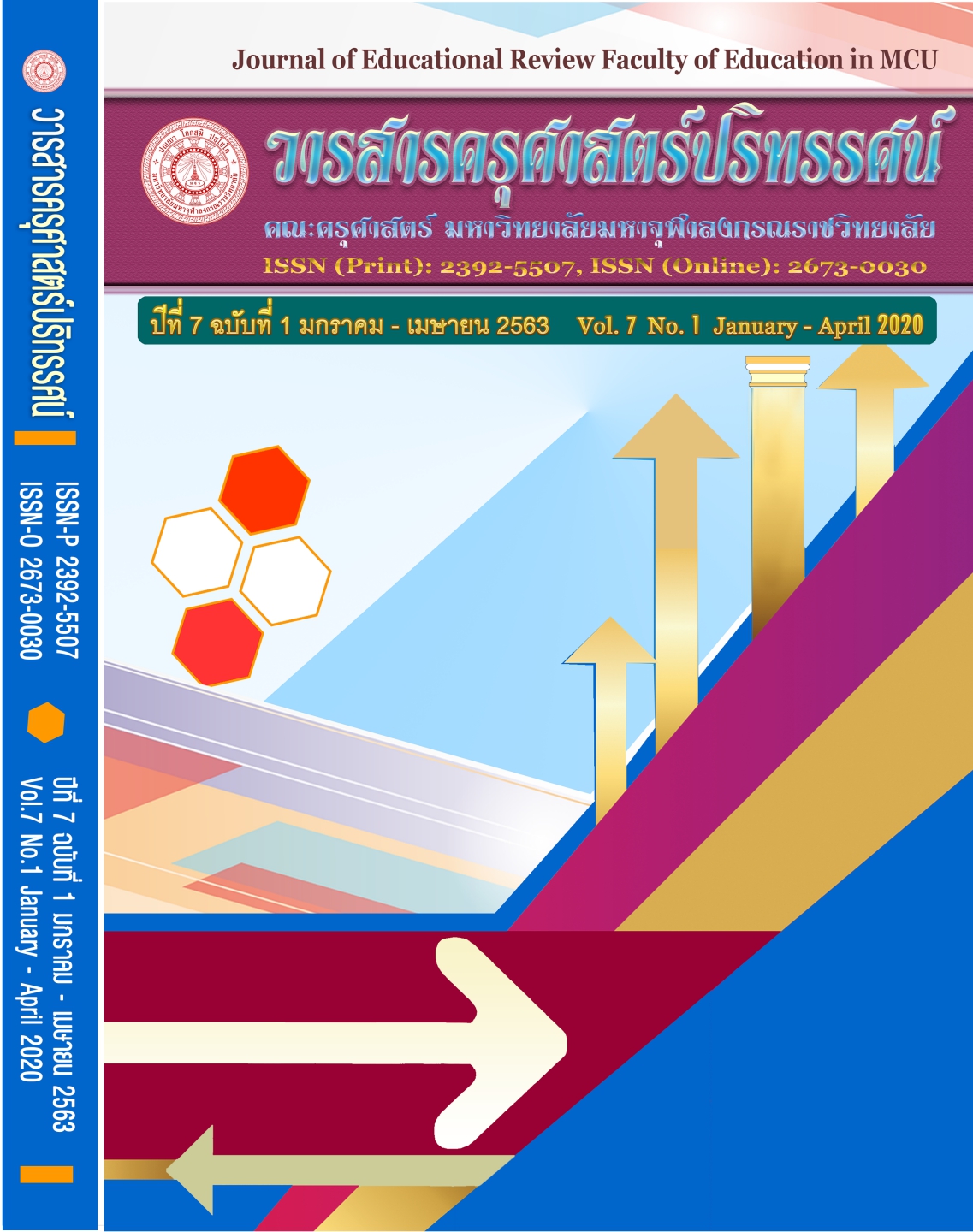THE LINEAR STRUCTURAL RELATIONSHIP MODEL OF FACTORS INFLUENCING EFFECTIVE TIME MANAGEMENT OF SCHOOL ADMINISTRATORS UNDER THE SECONDARY EDUCATIONAL SERVICE AREA OFFICE IN THE NORTHEAST REGION
Main Article Content
Abstract
The purposes of this research were 1) to study the causal factors influencing effective time management of the school directors, and 2) to validate the goodness-of-fit of the hypothesis model of causal factors with the empirical data. The study was divided into 2 phases. The first phase was the building of research conceptual framework by an analysis of relevant documents and researches, and interview with 7 experts and a case study of outstanding 3 standard of royal awarded school. The second phase was the validation of research hypothesis. Data was collected by a 5-level rating scale questionnaire with validity between 0.80 – 1.00, discrimination power between 0.42 - 0.75, and reliability value at 0.98. The samples were school directors under the secondary educational service area office in the northeast year B.E. 2560, totally 505. Sample sizes determination by using 20 times of the observed variables, and samples size was chosen by multi-stage random sampling. Data was analyzed by determining frequency, percentage, mean, standard deviation, Pearson's Product Moment Correlation Coefficient and analyze the causal relationship. Results indicated that 1) the causal factors influencing effective time management of the school directors under the secondary educational service area office in the northeast comprised of 4 factors, time management tools, waste time elimination, time management technique and time planning. 2) The developed model showed a goodness-of-fit with the empirical data (χ2 = 36.51, p-value = 1.00, df = 83, χ2/df = 0.43, RMSEA = 0.00, GFI = 0.99, AGFI = 0.98, Largest Standardized Residual = 1.74). The effective time management of the school directors has received direct effect from time planning, and time management tools; indirect effect from waste time elimination, and time management technique; total effect from waste time elimination, time management technique, time planning and time management tools, respectively. When considering the prediction coefficient (R2) of the four cause factors, the accounting for the variations in effective time management of the school directors was 81 percent.
Article Details
ทัศนะและความคิดเห็นที่ปรากฏในบทความในวารสารฉบับนี้ถือเป็นความรับผิดชอบของผู้เขียนบทความนั้นเพียงผู้เดียว และไม่ถือเป็นทัศนะและความรับผิดชอบของกองบรรณาธิการ
กองบรรณาธิการขอสงวนสิทธิ์ในการคัดเลือกบทความลงตีพิมพ์และจะแจ้งให้เจ้าของบทความทราบหลังจากผู้ประเมินบทความตรวจอ่านบทความแล้ว
ต้นฉบับที่ได้รับการตีพิมพ์ในวารสารครุศาสตร์ปริทรรศน์ คณะครุศาสตร์ มหาวิทยาลัยมหาจุฬาลงกรณราชวิทยาลัย ถือเป็นกรรมสิทธิ์ของคณะครุศาสตร์ มหาวิทยาลัยมหาจุฬาลงกรณราชวิทยาลัย ห้ามนำข้อความทั้งหมดหรือบางส่วนไปพิมพ์ซ้ำ เว้นเสียแต่ว่าจะได้รับอนุญาตจากมหาวิทยาลัยฯ เป็นลายลักษณ์อักษร
References
กระทรวงศึกษาธิการ. (2546). คู่มือการบริหารสถานศึกษาขั้นพื้นฐานที่เป็นนิติบุคคล. กรุงเทพมหานคร: คุรุสภาลาดพร้าว.
นงลักษณ์ วิรัชชัย. (2542). โมเดลลิสเรล: สถิติวิเคราะห์สำหรับการวิจัย. พิมพ์ครั้งที่ 3. กรุงเทพมหานคร: จุฬาลงกรณ์มหาวิทยาลัย.
เบิกอรุณ แสงแกล้วกล้า. (2559). บริหารเวลาอย่างชาญฉลาด เพิ่มโอกาสทำเงินล้าน. กรุงเทพมหานคร: ณ ดา
ปพนสวรรค์ โพธิพิทักษ์. (2556). ปัจจัยและรูปแบบการบริหารเวลาของรองผู้อำนวยการสำนักงานเขตพื้นที่การศึกษาประถมศึกษา. ดุษฎีนิพนธ์ปรัชญาดุษฎีบัณฑิต. มหาวิทยาลัยศิลปากร.
ปิยพจน์ ตุลาชม. (2557). รูปแบบการพัฒนาคุณลักษณะผู้บริหารมืออาชีพของผู้บริหารสถานศึกษาระดับมัธยมศึกษา. ดุษฎีนิพนธ์ครุศาสตรดุษฎีบัณฑิต. มหาวิทยาลัยราชภัฏวไลยอลงกรณ์ ในพระบรมราชูปถัมภ์.
สมชาย เทพแสง. (2548). การศึกษาปัจจัยบางประการที่ส่งผลต่อการจัดการคุณภาพโดยรวมของผู้บริหารโรงเรียนมัธยมศึกษา สังกัดสำนักงานคณะกรรมการการศึกษาขั้นพื้นฐานในเขตพื้นที่การศึกษากรุงเทพมหานคร. ดุษฎีนิพนธ์การศึกษาดุษฎีบัณฑิต. มหาวิทยาลัยศรีนครินทรวิโรฒ.
สมศักดิ์ ชาญศิริศักดิ์สกุล. (2547). ข้อคิดนักบริหาร. กรุงเทพมหานคร: สามเกลอ.
สุทธิชัย ปัญญโรจน์. (2557). เวลาของฉันหายไปไหน. กรุงเทพมหานคร: เพชรประกาย.
Azar, S. and Zafer, S. (2013). Confirmatory Factor Analysis of the Time Management Behavior Scale: Evidence from Pakistan. Interdisciplinary Journal of Contemporary Research in Business. 12(4). 946-959.
Macan, T.C. (1994). Time management: Test of a process model. Journal of Applied Psychologo. 3(78). 381-391.


